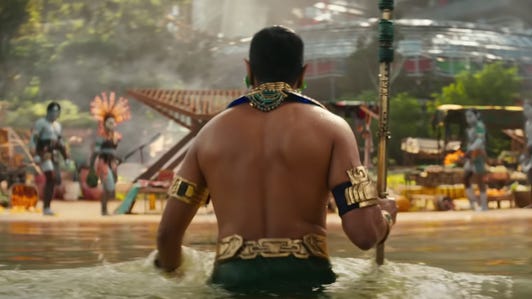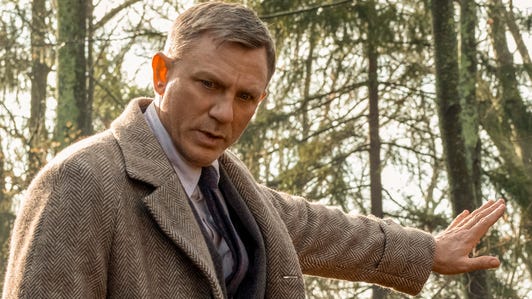
HBO comedy-drama The White Lotus has quickly made a claim for having some of the best opening credits out there. Along with the provocative Renaissance-style images that make up season 2's title sequence, Emmy-winning composer Cristobal Tapia de Vere is back with a remix of season 1's eclectic ear worm. (Check out his soundtrack to 2013 British series Utopia for more electrifying tunes.)
Season 2's decadent, yet increasingly sinister opening credits were created by Katrina Crawford and Mark Bashore, who are also behind the show's season 1 credits. The pair didn't plant overt clues to the multiple deaths in this season, instead drawing symbolic meanings to each character's journey. Let's dissect those meanings based on all seven episodes of season 2, including that brilliantly unexpected finale.
Warning: Spoilers ahead.
The traditional lovers
The first image we see in season 2's opening credits shows a man bowing to a curtseying woman -- a scene of what appears to be traditional Renaissance lovers (the style of art that emerged in Italy in the late 14th century). Here, titles creators Crawford and Bashore are setting up the themes of the Sicily-set second season: Where season 1 focused on privilege and colonialization, season 2 explores themes of male heterosexuality. In an interview, they also revealed that the coinciding image when an actor's name appears reflects the traits and journey of their character. Here, actor F. Murray Abraham's name appears -- he plays Bert Di Grasso, Dominic's elderly, womanizing father.
In the bottom left corner, a shield shows two rings connected by healthy branches. In the other: two wedding rings run through by a dagger. These rings seem to represent the two central marriages in season 2: the crumbling solidarity of Harper (Aubrey Plaza) and Ethan (Will Sharpe), and the accepted duplicity of Cameron (Theo James) and Daphne (Meghann Fahy).
Then the camera zooms in and reveals a woman spying on the lovers. This could be another sign of infidelity (in episode 3, Cameron sleeps with sex worker Lucia), as well as reflecting Harper's interest in the secrets behind Cameron and Daphne's loving front (also in episode 3, Daphne reveals she's aware of Cameron's infidelity).
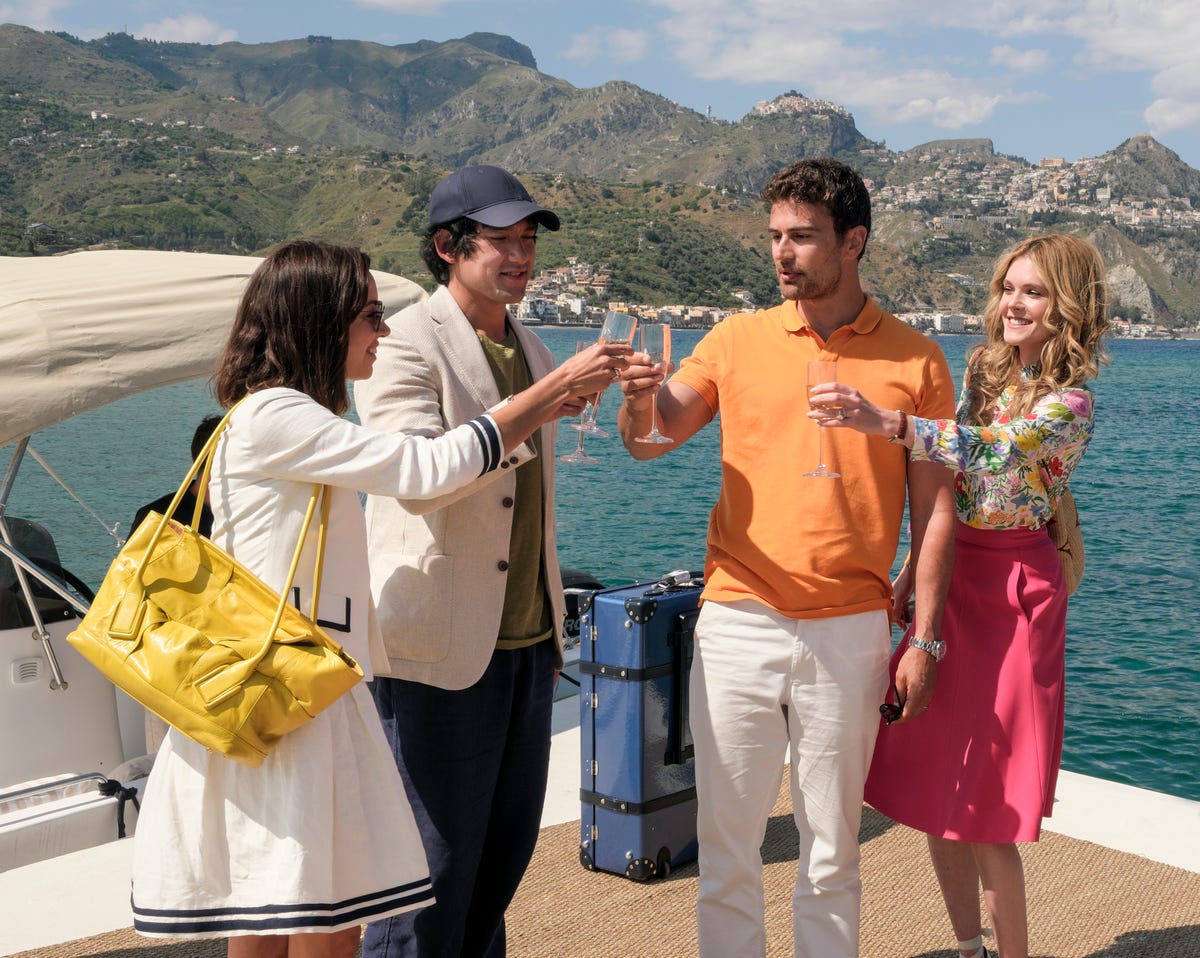
And everything started so well.
Fabio Lovino/HBOThe woman and the chained monkey
The camera pans up to show a blond woman holding a chain attached to a monkey. This could be interpreted in a couple of ways -- if the woman is meant to represent Tanya (Jennifer Coolidge's name appears in this section of the credits), then the monkey could be her husband Greg (Joe Gries), who feels indebted to Tanya after she paid for his medical bills and essentially saved his life. The monkey could also be a symbol for Tanya's assistant Portia (Hayley Lu Richardson), forced to go on vacation with her boss.
The innocent man, the babies and the sphinx
The next scene shows a man playing music for a woman with a happy-looking dog nearby. Here, actor Adam DiMarco's name appears -- DiMarco plays the sincere and naive Stanford graduate Albie, who was intent on acting like a gentleman toward women, unlike his father, and even thought he was saving sex worker Lucia from her oppressive handler.
Next, we see actor Meghann Fahy's name appear over an ornate image of two naked baby boys. When not on holiday, Fahy's character Daphne is a stay-at-home mother. In episode 5, it's revealed those boys might not be Cameron's children, but those of the personal trainer Daphne sees while Cameron is tied up at work.
Then actor Beatrice Grannò's name appears with a gold sphinx -- her character Mia, an aspiring singer, resists her friend Lucia's attempts to introduce her to sex work... until episode 4, when she chooses to have sex with pianist Giuseppe in order to further her musical career. In Greek mythology, the riddle of the sphinx references three stages of man: baby, adult and old. It's not hard to deduce which three men are being referenced here in The White Lotus -- the Di Grassos. Mia and her friend Lucia have many encounters with all three Di Grasso men.
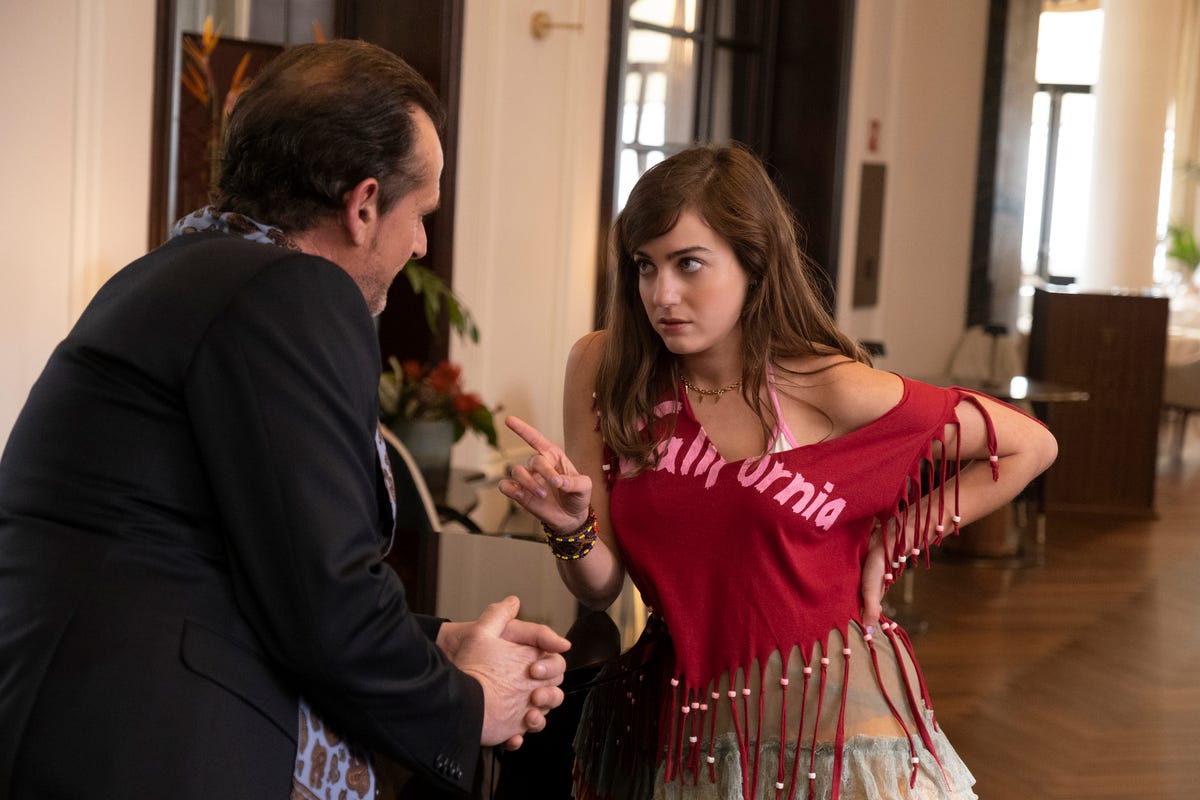
Mia accepts Giuseppe's proposition.
HBOThe donkey and the lovers
Actor Jon Gries' name appears next over an image of a man and a woman riding a donkey -- a donkey almost shiftily looking over its shoulder toward us. This could symbolize Gries' character Greg cheating on his wife Tanya with another woman -- or another man, as we see when he apparently appears in an old picture with British expat Quentin. In episode 2, Greg leaves Tanya alone at the resort, saying he has to fly back to Denver for work. In the finale, Tanya deduces that this was so he would have an alibi while Quentin and his men had her killed.
We then see the names of actors Tom Hollander and Sabrina Impacciatore over men and women separated on either sides of a room. This seems to point to how Hollander's character Quentin, a wealthy gay British expat, is seemingly on holiday with his large group of friends. Meanwhile Impacciatore's character Valentina, the resort manager, reveals feelings for receptionist Isabella (Eleonora Romandini) in episode 4, then later has a sexual awakening with the help of Mia in episode 6.
The cracked fresco, a giant statue and fighting birds
In an intriguing fresco set on the water, we see a man bowing down before a younger man and a woman who drops a necklace into the sea. Actor Michael Imperioli's name appears here -- his character Dominic, a sex addict and father of Albie, has been desperate for the forgiveness of both his son and wife, who are disgusted by his affairs and betrayal. In episode 4, he buys his wife a piece of jewellery as a gift and in the finale, he's willing to pay 50,000 euros in exchange for his son putting a good word in for him with his wife.
Next we see actor Theo James' name over a giant naked statue of a man -- in episode 1, James' character Cameron deliberately undresses and exposes himself to Harper. Here, we also see a dog peeing on the statue -- a show of disrespect toward everything it represents.
Above, we see two birds at war with each other, alongside actor Aubrey Plaza's name. The light and dark-colored pecking birds could represent the dueling intentions of Plaza's character Harper. In episode 6, Harper appears to consider cheating on her husband Ethan with Cameron, after suspecting Ethan lied to her about what he and Cameron really got up to while she and Daphne were away at the fancy palazzo in Noto. In the finale, Harper confirms Cameron kissed her, although now it's Ethan who suspects more happened that she's unwilling to admit.
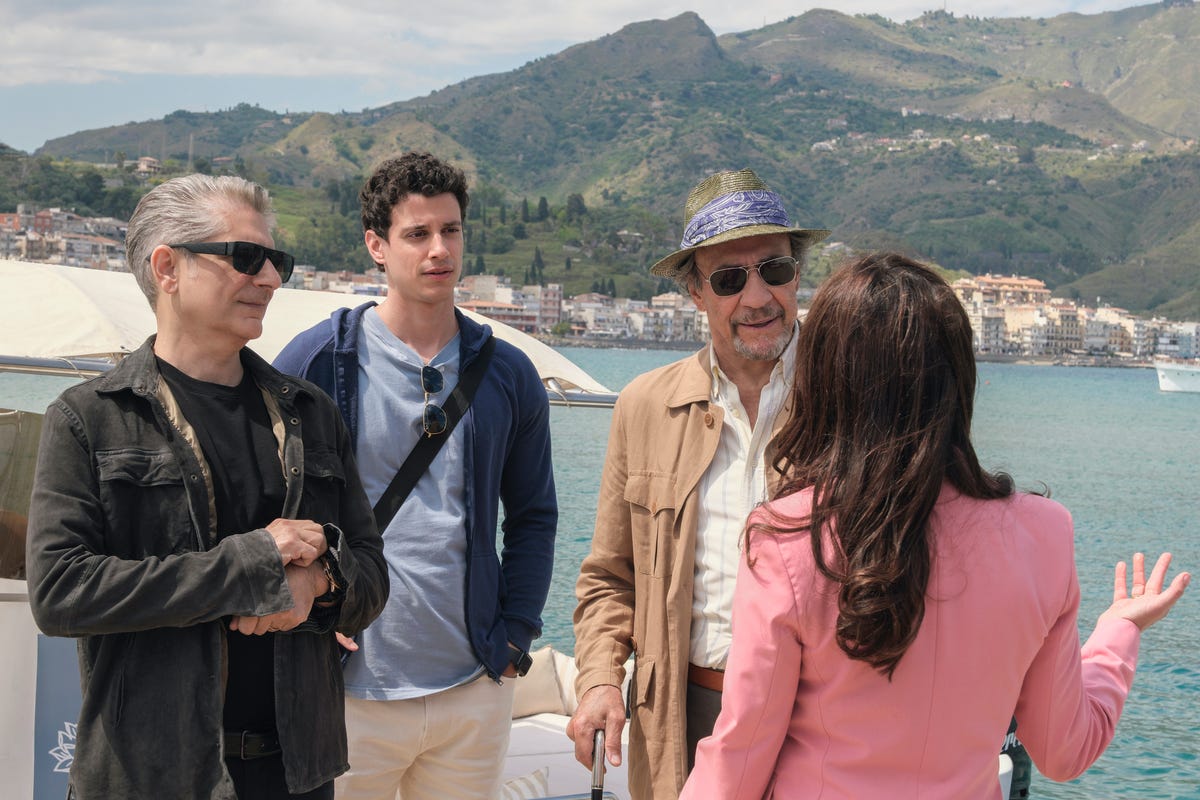
The three generations of Di Grasso men.
Fabio Lovino/HBOThe sacrificial lamb and the offering
In the next scene, alongside actor Haley Lu Richardson's name, we see what looks like a lamb and a maid sitting on the ground. Richardson's character Portia is at her boss Tanya's beck and call, so the maid probably represents her low status. It also looks like the maid has her back turned to the lamb -- the lamb could represent Albie, the man Portia found overly gentle, innocent and unexciting in comparison to Quentin's charismatic and cheeky nephew Jack (Leo Woodall).
The next scene is a tad confusing -- it shows a man making an offering to a regal-looking woman, with actor Will Sharpe's name. Is this Sharpe's character, Ethan, serving Harper an apology? Or is this to represent his newfound wealth that he's sharing with her?
The cat and the aggressive men
Next up: a small cat with leopard spots and a little bird in its mouth, slinking around a column. Actor Simona Tabasco's name appears here -- she plays local hustler and sex worker Lucia, who exclaims in episode 4 that she turned her previously conservative friend Mia into a monster. Maybe Mia's innocence is supposed to be the little dead bird in the cat's mouth. In the later episodes, Lucia also seems to grow more and more fond of the impressionable Albie. Maybe his innocence is also represented by the dead bird, which she takes full advantage of in the finale, hustling him for 50,000 euros.
Actor Leo Woodall's name appears next, alongside an image of one man standing over another. On the one hand, it looks like a threatening situation: the former's foot is placed in a pretty perilous positing between the latter's legs. This could represent Woodall's character Jack being forced to work for Quentin and do things he doesn't want to do. This scene might also have a more sexual implication: We learn in episode 5 that Jack is engaging in sexual acts with his "uncle" Quentin.
The burning building and the white swan
As the beat of the music ramps up, the images become even more explicit. We see:
- A hotel-like building burning in the distance -- no prizes for guessing the meaning behind this one (things metaphorically go up in flames at The White Lotus).
- Two men engaged in sexual activity on a beach.
- Goats also engaged in a sexual act.
- Three circular holes in the side of a wall -- which could represent the three generations of the Di Grasso men and their behaviour toward women following a circular pattern.
- General scenes of violence and blood.
- A woman being seduced by a swan -- this seems to be a reference to the story of Leda and the swan in Greek mythology, where the god Zeus transforms into a swan and rapes Leda, the queen of Sparta. It isn't totally clear if this is explicitly referring to any single character in the show. Maybe the woman is supposed to be Tanya, Portia, Isabella, Daphne -- any one of the women taken advantage of by a man.
- A fountain rising -- a phallic image.









 Add Category
Add Category